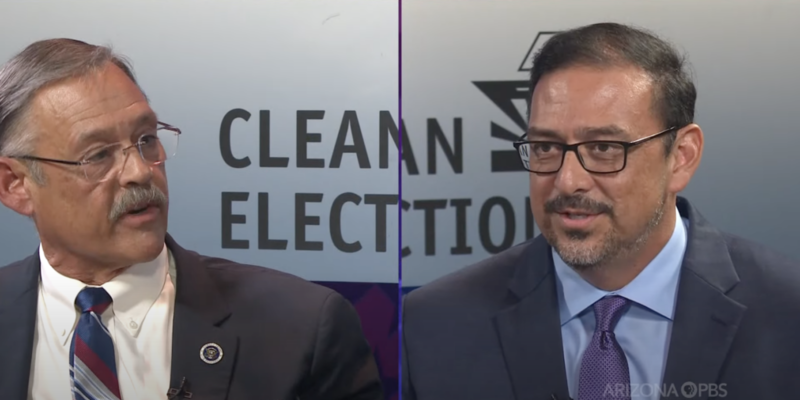Mark Finchem’s fealty to the ‘Big Lie’ was center stage in debate with Adrian Fontes

Mark Finchem, the Republican candidate for secretary of state who has built his campaign on baseless claims the 2020 election was marred by fraud, continually dodged questions and spouted conspiracy theories in a televised debate Thursday night.
His Democratic opponent, Adrian Fontes, said voters will have to make the choice between “laws and lies.”
Fontes, a former Maricopa County recorder who lost his re-election bid in 2020, framed November’s election as a referendum on democracy.
“Democracy is a decision, and as you’ve seen tonight, that decision could be no more clear,” Fontes said. “You can decide between community building and stability or conspiracy theories and cantankerousness.”
Finchem, a state legislator from Oro Valley, is one of the nation’s most vocal proponents of the “Big Lie” that former President Donald Trump really won the 2020 election. His devotion to false conspiracy theories about the 2020 election has earned him a national profile, along with Trump’s endorsement.
Finchem refused to say during Thursday’s debate whether he would have certified Arizona’s general election results if he were secretary of state in 2020. In a story published this week in Time magazine, Finchem said it is “a fantasy” to believe that the 2020 election was fair.
Finchem called the 2020 election results in two counties — Maricopa and Yuma — irredeemable, but gave no evidence as to why he believed the results in Maricopa County were invalid. State Senate Republicans hired unqualified conspiracy theorists to conduct a partisan review of the Maricopa County 2020 election results; their review found no evidence of fraud.
During the debate, Finchem referenced the movie “2,000 Mules” as evidence of fraud in Yuma County and said that three people have pleaded guilty to election fraud in the county.
An analysis of the film’s claims by the Associated Press found numerous problems with the data analysis. For instance, there is no accounting for people with multiple mobile devices that could create pings in the geolocation data or people who are elections or campaign workers who would drive by areas where drop boxes are located on a regular basis. Other fact-checkers have also done independent analysis of the claims and found them to be fundamentally flawed.
Finchem repeatedly asked during the debate why so-called fraud had not been addressed.
Fontes answered that, if there actually was widespread fraud in Arizona during the 2020 election, there were several ways to address it — but all of the county governing boards, the secretary of state and the governor certified the election.
Democracy is a decision, and as you’ve seen tonight, that decision could be no more clear. You can decide between community building and stability or conspiracy theories and cantankerousness.
Finchem never answered a question from moderator and veteran journalist Ted Simons about what he thought was going to happen on Jan. 6, 2021, as he stood in a crowd near the Capitol and watched a mob of Trump supporters storm the building. Finchem claimed he never got within 1,500 feet of the Capitol, but he posted a photo he took from near the Capitol steps onto social media and was captured on video amidst the rioters.
Finchem said he was not at the Capitol for the Trump rally, but to deliver a book of evidence of purported voter fraud in the 2020 election to Republicans at the Capitol.
“Being at a place when something happened is not a crime,” Finchem said, adding that he had been interviewed by the congressional committee investigating Jan. 6 as a witness to the storming of the Capitol, not a participant.
While Finchem criticized Fontes for how he handled the 2020 election in Maricopa County — particularly his illegal decision to mail ballots to all registered voters because of the COVID-19 pandemic — Fontes countered that Finchem wants to get rid of voting by mail entirely.
Finchem, who backed legislation doing exactly that, dodged the question.
“What I want doesn’t matter,” Finchem said, adding that the secretary of state doesn’t make policy decisions.
Finchem later said that he didn’t care for voting by mail, but does support absentee voting, indicating that voters should have to ask for a mailed ballot instead of just being sent one automatically.
During their back-and-forth about voting by mail, the two candidates interrupted and spoke over one another.
When asked if he thought the 2022 midterm election in Arizona was fair, Finchem said he didn’t know. In answer to a question from Simons, Finchem said the difference between the 2020 general election in Arizona and the 2022 primary was the candidates.
Fontes countered that it was telling that Finchem didn’t say the processes or the people running the election were different, only the candidates.
Fontes accused his opponent of playing politics instead of respecting the will of the voters, while Finchem accused Fontes of making up election law, repeatedly referencing an opinion piece by Laurie Roberts of the Arizona Republic. In the column, she accused Fontes of making up election law in March 2020, when he decided to mail ballots to all registered Democrats who had not yet voted in the presidential primary, amid the start of the COVID-19 pandemic. A court ultimately blocked him from doing so.








